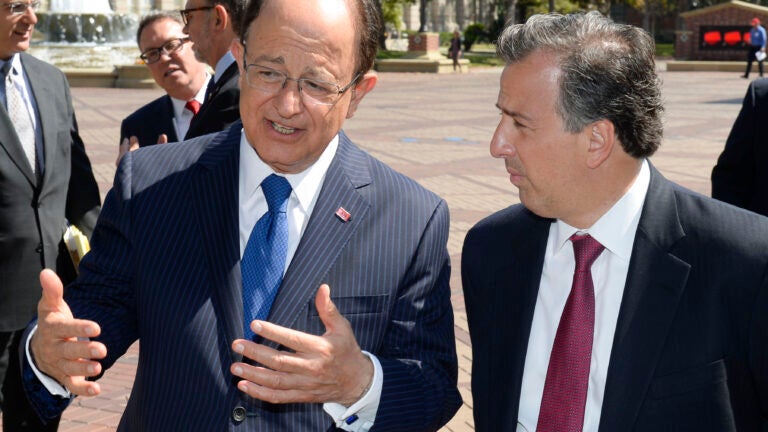
USC President C. L. Max Nikias, left, meets with Jose Antonio Meade, secretary of foreign affairs for Mexico. (USC Photo/Gus Ruelas)
USC and Mexico align to boost opportunities in education and innovation
Top government officials meet with President Nikias and USC Trustee Roski
USC strengthened its ties with the government of Mexico during a recent visit by a delegation led by Mexican Secretary of Foreign Affairs Jose Antonio Meade.
Along with Sergio Alcocer, under-secretary for North American affairs, and Carlos Sada, consul general of Mexico in Los Angeles, Meade met with USC President C. L. Max Nikias and USC Trustee Edward P. Roski, Jr. after the launch of the U.S.-Mexico Bilateral Forum on Higher Education, Innovation and Research in Mexico City.
The May 21 forum, which was jointly convened by U.S. Secretary of State John Kerry and Meade, was established to foster the growth of student exchange, research and innovation programs between the U.S. and Mexico.
Mexico is an especially important partner in creating intellectual capital that benefits our region and accelerates growth in both of our countries.
C. L. Max Nikias
“The University of Southern California is committed to supporting scholarly talent from all over the world, and Mexico is an especially important partner in creating intellectual capital that benefits our region and accelerates growth in both of our countries,” Nikias said.
USC and Mexican officials expressed strong interest in furthering the relationship between USC and Mexican policymakers and education and business communities during a visit by a USC delegation to Mexico City planned for the 2014-15 academic year.
High-level pacts
Meade’s visit is the latest in a recent series of high-level exchanges and agreements between the U.S. and Mexico that focus on USC. In March, Thomas Sayles, USC senior vice president for university relations, accompanied Los Angeles Mayor Eric Garcetti on an international trade mission to Mexico.
During the mission, Garcetti announced a new collaboration between USC and the Bank of Mexico Fund for Development of Human Resources, which establishes joint scholarships for master’s students enrolled in the USC Marshall School of Business, the USC Annenberg School for Communication and Journalism, the USC Gould School of Law, the USC School of Architecture and the USC Viterbi School of Engineering.
Six months earlier, the USC Price School of Public Policy announced an agreement with Mexico’s National Council of Science and Technology to establish a joint program of graduate fellowships to increase the capacity for public administration, urban planning and public policy in Mexico.
The USC Price effort aims to facilitate the professionalization of Mexico’s public sector and increase ties between the U.S. and Mexico.
Both programs expand on the success of earlier interchange between USC and Mexican partner institutions, such as USC Viterbi’s doctoral student cohort program led by Professor Francisco Valero-Cuevas, funded by Mexico’s National Council of Science and Technology.
USC’s global presence
Juan-Miguel Ramírez-Rocamora, one of the first students who came to USC through the program, completed studies at the National Autonomous University of Mexico before attending USC, and he went on to receive the Manuel Franco-Lopez Award, a coveted recognition of achievement in engineering.
In addition, one of USC’s current International Artist Fellows, Jacinto Astiazarán, combines his roots in Mexico with his creative education at USC. He grew up in Tijuana, Mexico, received his bachelor’s degree at the USC School of Cinematic Arts, worked on video projects in Mexico City and now is pursuing an MFA at the USC Roski School of Art and Design.
For 12 years, USC has topped the list of U.S. colleges and universities with the most international students, according to the Institute of International Education. It’s also been one of the top producers of Fulbright student grant recipients. In 2013, USC sent 12 scholars to countries ranging from India to Vietnam for a year of study.
USC’s global presence encompasses offices in Mexico (Mexico City), Brazil (Sao Paulo), China (Hong Kong, Shanghai, Beijing), Taiwan (Taipei), South Korea (Seoul) and India (Mumbai). The USC Mexico Office was established in 2005 under the auspices of the USC Office of Global Initiatives, currently led by Anthony Bailey, vice provost for global initiatives.



